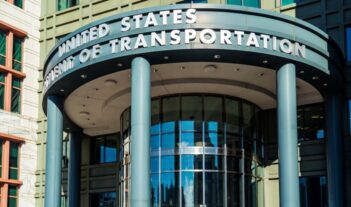
The Biden Administration should discard a recent proposal to impose reciprocal switching on U.S. railroads.
The pandemic accelerated the amount of online shopping by U.S. residents, and a large proportion of the U.S. population has grown accustomed to eschewing stores and having most goods delivered to their homes.
This trend has increased the number of trucks on the road, which has created congestion, parking problems, and more emissions due to traffic across the country. The recently passed Infrastructure Investment and Jobs Act contains $8 billion to boost freight infrastructure and safety programs. The state of Georgia is spending $1.8 billion a year, following a state recommendation that Georgia reduce problems caused by the surfeit of trucks.
Rather than address the issue, the Biden Administration appears intent on making this problem worse by embracing several policies that would result in fewer goods traveling by rail and more being transported via highways.
The most egregious of these efforts is a 2021 Biden Administration executive order that asks the Surface Transportation Board to consider forcing railroads to engage in reciprocal switching, which would ultimately push goods off of railroads and onto trucks.
Reciprocal switching would allow shippers to choose railroads without tracks adjacent to their locales to transport their goods instead of railroads whose tracks connect directly to their facility. The railroad that owns the tracks that connect to the shipper’s facility would be forced to pick up goods for the shipper and deliver them to a competing railroad, which would carry them to the customer.
The Biden Administration avers that reciprocal switching will reduce inflation by constraining shipping prices, but the data do not show that rail prices increased more in 2021 than in previous years, so attributing any of the 2021 inflation spike to rail costs seems to be little more than dissembling.
The problem with reciprocal switching is that it effectively reduces the capacity of the rail networks. Switching trains is time and labor intensive and therefore costly. Requiring railroads to do so for competitors would impose more work in already congested networks, making it more difficult for the railroad doing the switch to optimize its train schedule.
Railroads boost capacity not only by adding or expanding tracks but also by adapting their schedules to carry more trains and fuller trains each year. Accomplishing this task is a significant logistical feat, and railroads spend heavily on computer power and teams of analysts to accomplish these improvements. Forcing railroads to switch for competitors wreaks havoc with this scheduling, dramatically reducing its efficacy. A railroad would have to build excess capacity into the system—or else adapt by delaying other trains when a switch occurs.
Reciprocal switching would result in fewer trains traveling in a network on a given day and on a less predictable schedule, which would invariably result in more goods traveling by truck. Such an outcome would pose environmental problems since rail emits approximately 2 percent of greenhouse gas emissions in the U.S. transportation sector compared to trucks, which emit approximately 24 percent.
It is puzzling why an Administration that has prioritized reducing greenhouse gas emissions would embrace a policy that would worsen climate change. But it does comport with their misguided contention that the current inflationary climate results from a lack of competition despite feedback from economists—on the right and the left—who see inflation resulting largely from accommodative monetary policy and the massive fiscal stimulus program passed in early 2021.
The irony is that a robust reciprocal switching rule that reduces productivity growth in the rail sector would exacerbate current inflationary pressures and supply chain woes.
A reciprocal switching rule would also make expanding passenger rail in the United States more difficult because Amtrak relies on freight rail outside of the Northeast Corridor and the last thing it wants is increased variability in trip times. This reality is one reason that Amtrak opposed the switching regulation when it was first proposed in 2016.
The Biden Administration must come to recognize the costs to the economy and the environment from imposing reciprocal switching on U.S. railroads and should discard its plan promptly.





